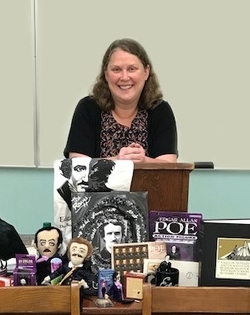Faculty and Staff

- Professor
- sandy.hughes@wku.edu
- Cherry Hall 11
Introduction to College Writing; Introduction to Literature; American Studies [Topics: Utopias/Dystopias, Justice in America, Dissent]; Survey of American Literature to 1865; Special Topics [American Short Story, American Gothic Literature]; Honors Special Topics [Transatlantic Gothic Literature]; Studies in 19th-Century American Literature; Studies in American Literature [Responses to Poe: Bicentennial Reflections]; American Short Story; American Romanticism; American Realism and Naturalism; Seminar in American Authors [Poe and Melville, Hawthorne and James in Italy]; Introduction to Japanese Culture [study abroad course]; The Warrior and the Poet: Japanese Literature in Translation [study abroad course]; Gothic Literature in Italy [study abroad course]; Responses to Italian Art and Architecture: Hawthorne and James [study abroad course]
American Romanticism, Gothic literature, Nathaniel Hawthorne, Edgar Allan Poe, the short story
Sandra Hughes, a native of western Kentucky, earned her BA in English, Spanish, and psychology at Kentucky Wesleyan College. After completing an MA in English at Marquette University in Milwaukee, she taught English for three years in Chiba, Japan. Upon returning to the US, she obtained her PhD in American literature from the University of Georgia, where she was also a Robert Park Postdoctoral Teaching Fellow. Since 2004, she has taught at WKU, where she has won the PCAL and University Teaching Awards. She has taken students on month-long study abroad trips to Japan in 2008, 2013, and 2017, and to Italy in 2011. She has published work on Nathaniel Hawthorne, Edgar Allan Poe, Henry James, and Louisa May Alcott, and has delivered conference papers in Portugal, Spain, France, Italy, Greece, the UK, the US, and Japan. Her article on Poe's "The Pit and the Pendulum" and James Wan's Saw was her first foray into scholarship of torture. She is a past president and current member of the executive board of the Nathaniel Hawthorne Society. An avid traveler, she has visited 17 countries or territories, and hopes to add more soon. Her Labrador retriever, Sophia Pawthorne, is named for Hawthorne's wife.
As a teacher of first-year writing, I all too often hear students say something like “I know I’m a terrible writer,” or “I'm just not good at English.” If left unchallenged, such comments can become self-fulfilling prophecies. Because I hold a firm belief that every student can do something well, I try to vary classroom activities so each student has a chance to realize his or her potential. Some students contribute meaningfully to discussions, some write strong journal entries they can share with the class, others prove to be skillful at peer editing, and still others excel in class debates about current events. I want my classroom to be a place where students cooperate rather than compete, so I ask students who are good at a certain task to help those who are having trouble, with the understanding that tutor-learner roles will shift based on the activity in which the class is engaged.
Teaching general education classes is an important part of an English Department faculty member's job since close reading, critical thinking, and effective writing are at the very heart of what we do in English. I ask my general education students to do several types of writing for different purposes or groups of intended readers in order to enhance their awareness of their rhetorical situation. Since I view writing as a process, I ask my students to prepare multiple drafts of each essay they submit. Near the end of the semester, I require that they revise an earlier paper for a grade because I want them to realize that writing, like thinking, is never finished.
Whether I am teaching first-year writing, a literature survey, or a literary topics course for English majors or graduate students, I seek to communicate my enthusiasm for the material to the class and to encourage a high level of student involvement. I see myself as responsible for creating a positive learning environment that makes students feel comfortable, yet intellectually challenged. I want my students to question and analyze what they read, not to settle for a facile interpretation of the text. Indeed, while I am dedicated to giving my students a detailed introduction to major periods and movements in American literature, I am less interested in teaching them a single, definitive interpretation of each text we study than in teaching them how to read and interpret literature for themselves.
I have spent over three years of my life teaching in Japan, most recently with KIIS in 2008. As a teacher, I have learned a great deal from kyudo, or Japanese archery. When novices begin to study kyudo, they are given neither a bow nor arrows. They practice the proper form for drawing the bow with a flexible cord, sometimes for as long as a year, until they earn the teacher’s permission to proceed to the bow. Then they learn the proper stance and balance for drawing the bow itself, still without an arrow. Eventually, they proceed to firing arrows without trying to hit the target. It is only after a great length of time that a student begins to aim at the center of the target. Watching my Japanese high school students practice kyudo showed me the importance of patience, of process, and of high expectations. I am deeply dedicated to the process of becoming a better teacher, of pushing myself and my students toward higher levels of achievement. As Thoreau writes in Walden, “In the long run men hit only what they aim at. Therefore, though they should fail immediately, they had better aim at something high.”

